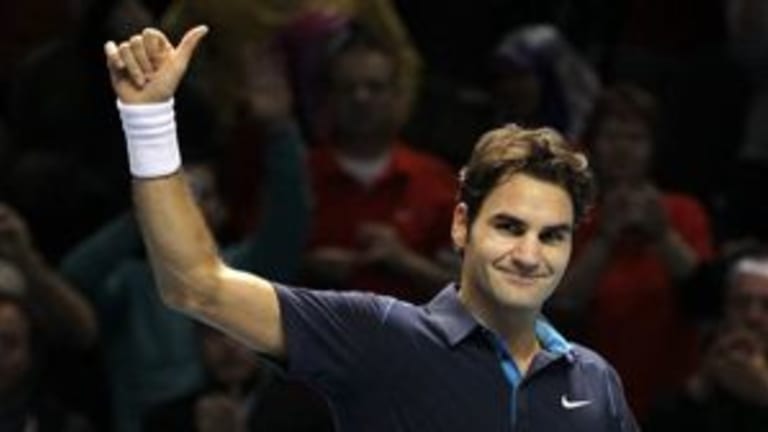From Roger Federer’s side of the net, there were two competing narratives at work in the third set of the London final on Sunday.
On the positive side, there was the story of his late-season form. For the second straight year, Federer was trying to outlast his rivals and finish the year at his best. In 2010, he had won this tournament and gone 21-2 after the U.S. Open; this time he had outdone himself by going 16-0 and winning two tournaments since Flushing Meadows.
On the downside, though, as the third set progressed, Federer still appeared to be haunted by the other, less-happy story of his 2010 and 2011: the curse of the match point. His last two seasons have been largely defined by his inability to close out seemingly certain wins. The most famous instance came in his semifinal loss to Novak Djokovic at the Open, and now it looked like it could happen again. Federer had dominated the first two sets against Tsonga, served for the match at 5-4 in the second, and held a match point at 6-5 in the second-set tiebreaker. Still, Tsonga had escaped, and by the third set he had found an ominous serving rhythm.
This time, though, the curse was broken, and Federer made his late-season excellence the tale of the day by winning 6-3, 6-7(6), 6-3. The key came when he was serving at 2-2 in the third set. He went down 15-30, and some of the telltale signs of demises past had begun to show up in his game and his body language. Federer had lost his service rhythm as Tsonga was finding his; and when he couldn’t capitalize on a 15-30 lead of his own in the second game of the set, his shoulders had begun to slump, the same way they had slumped through the latter stages of his loss to Tsonga at Wimbledon this year. At 2-2, 15-30, Federer missed another first serve; Tsonga bounced on the opposite baseline looking eager. But Federer caught him with a good second delivery into the body to win that point. We didn’t know it at the time, but the danger had passed. Federer hit an ace at 30-all and went on to hold. Ten minutes later, he was back in top form, breaking Tsonga in a long and brilliant game and holding at love to close it out.
There was a third storyline today: Federer’s record sixth World Tour Finals title. He passed Ivan Lendl and Pete Sampras with this win, and for most of the first two sets, he did it with Samprasian opportunism. By 4-3 in the first set, Federer had managed to win just one point on Tsonga’s serve. No matter: He won four straight in that game. The backbreaker came at 0-30, when Federer came up with a seemingly impossible get on his forehand side—no one who saw it would dare say he’s lost a step—and finished the point with a running backhand pass. A few minutes later, the first set was his. Tsonga, who had been standing toe-to-toe with Federer in rallies and knocking off clean backhand passes, must have wondered what hit him.
And it hit him hard. The Frenchman went on to play a loose second set, filled with drop shots and errors and missed returns. At 4-5, though, he decided to make a stand, and he made the afternoon worthwhile by doing so. The Frenchman has played the best tennis of his career in the second half of 2011, and we saw why today. As usual, he was all over the place—flat as a pancake one minute, grinning and trying ill-advised shots the next, totally unstoppable a few points later. The peak came with him serving at 3-4 in the third set. Pounding serves and racing in on forehands, Tsonga saved two break points—one with a finely angled forehand volley—before succumbing. Federer broke him by doing the one thing he's struggled to do against Tsonga this year: making his backhand return.
In many ways, this match was like their round-robin encounter one week ago. Federer started well, Tsonga revved himself up to win the second, but the veteran champion knew that if he hung in long enough, he’d have another chance. This time he squandered a match point and recovered. Federer remains the king of the WTF, and the king of the great indoors. That may nor may not mean anything for 2012—his success last fall didn’t carry over into 2011—but for the moment the former No. 1 is reminding us that he’s at least still in the mix.
More important for the future, Federer also remains the king of the long haul. While Djokovic and Rafael Nadal, beaten down by the long season, were half-there in both mind and body, the 30-year-old Federer savored and enjoyed every moment of London as if he were winning his first title, rather than playing in his 100th final. He finishes 2011 not as the best player in the world or the champion at its biggest tournaments, but as the last man standing, the last man smiling, the last man crying, the last man winning. You get the feeling that he'll be doing all of those things for some time to come.
—Steve Tignor
